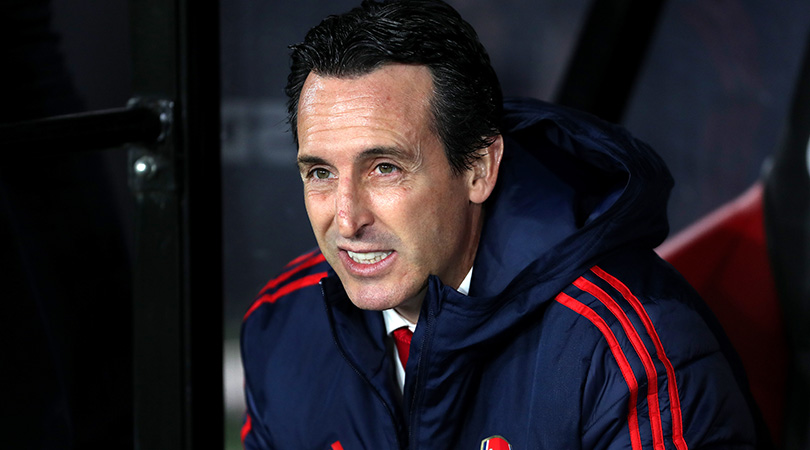Unai Emery was supposed to be the boring anti-Wenger – so why has he made Arsenal's flaws even worse?
It was supposed to herald a new dawn for the Gunners; one of organisation and serious improvement. Instead, the circus goes on...

The best features, fun and footballing quizzes, straight to your inbox every week.
You are now subscribed
Your newsletter sign-up was successful
Want to add more newsletters?

Five times a week
FourFourTwo Daily
Fantastic football content straight to your inbox! From the latest transfer news, quizzes, videos, features and interviews with the biggest names in the game, plus lots more.

Once a week
...And it’s LIVE!
Sign up to our FREE live football newsletter, tracking all of the biggest games available to watch on the device of your choice. Never miss a kick-off!
Join the club
Get full access to premium articles, exclusive features and a growing list of member rewards.
We’ve moved past the point at which articles about Arsenal and Unai Emery have to dedicate their first paragraph to Arsene Wenger. Now, the conditions Emery inherited are only tenuously relevant to the team he has constructed; there are still asterisks and mitigating factors further up the club, but what appears on the pitch now reflects his work.
But that’s the problem: Arsenal's performance continue to show something without a proper definition.
In a recent column for The Athletic, Amy Lawrence, in addition to noting Arsenal’s range of depreciating offensive statistics, described Emery as "a man with a giant bunch of keys desperately trying all of them to see if one will unlock the damned door before trouble arrives".
It’s perfect, because it captures just how random life at Arsenal currently appears to be. Performances don’t seem to instruct each other; there’s never a suggestion of an approach being gradually shaped or of wisdom being gathered. In fact, quite the reverse: take a seat to watch Arsenal and there’s no way of knowing what you might see.
In one sense, yes, defeats like that suffered at Bramall Lane are entirely predictable, both anecdotally – the 'cold Monday night in the North' narrative – and in reality. It was no surprise to hear the fan channels chuntering away about spirit and application in the aftermath, even though their side had been beaten by more than just a cluster of regional clichés.
Those are also flaws which are consistently overstated. Not least because, with the exception of Liverpool and Manchester City, they’re shared by every other club in the Premier League. Arsenal’s fragility is such a common theme, but it’s a false construct – are they really any softer than Chelsea, Tottenham or Manchester United? Not just at the moment, but over the period which marks their protracted decline. Do they lose more leads, do they fail to win games by means which are obviously more pathetic?
Not really. It's just too tempting to identify these issues in Arsenal now; those articles are written almost from muscle memory. So, really, it’s just the easy way of explaining their defeat to Sheffield United – that weakness of spirit argument, which deals almost exclusively in metaphor.
The best features, fun and footballing quizzes, straight to your inbox every week.
But what that game actually described, was that well-coached sides will generally beat those which aren’t, and that big contracts and famous players aren’t always enough to overcome that deficit.
And that’s why Arsenal’s situation is so concerning. When Emery arrived, he was presented as Wenger’s antithesis. He was the pale-skinned, video bunker-dwelling response to years of cavalier idealism. He was supposed to bring the boring detail which, as he got older, Wenger had grown increasingly uninterested in. Emery was meant to distil Arsenal from their flair and make them less reliant on the whims of individual players.
If anything, the opposite has happened. What seems to separate one performance from another is not tactical planning, technical execution or commitment, but bursts of form or power from within the team. Every win or loss is viewed through that prism. Each result this season can consequently be attributed to the actions – good or bad – of a single player or a specific department.
Rightly so, because that does seem to be the predominant influence. Arsenal are structurally so incoherent and possess so few obvious themes that what alternative is there? The dependencies have deepened, the reliance on these pockets of ability is greater than ever, and Monday’s loss was just the most recent example of that. Emery needed Pierre-Emerick Aubameyang to conjure something unlikely, he was waiting for Matteo Guendouzi to find that one impossible pass; there was never a sense during the game that Arsenal possessed any sort of structural or organisational advantage.
So where does his influence manifest? Next time Arsenal are trying to play the ball out from the back, query whether they really look like a side with a coherent understanding for their own gameplan. Notice the porousness of the midfield, too, and the lack of central creativity further forward. Emery was sold as someone who emphasised details, with - ironically - the fear being that he would bore his new players rigid with the meticulousness of his preparation. Where is the evidence of that coach's impact?
Eighteen months in, that’s an incredibly damning assessment. When supporters ask what the ‘plan’ is supposed to be, that’s often dismissed as trite, superficial criticism. Often it is. But In this instance it’s proportional and absolutely right. To those who encourage Arsenal fans to retain their faith, what's the basis for that; what are these confused defeats and scattergun team selections in aid of?
This team is now looser, more muddled and – bluntly – getting worse.
While you're here, why not take advantage of our brilliant subscribers' offer? Get the game's greatest stories and best journalism direct to your door for only £9.50 every quarter. Cheers!
NOW READ...
COMMENT Don’t buy into the fantasy: why there's no Raheem Sterling redemption story
QUIZ How many of the 155 Premier League managers during Arsene Wenger's Arsenal reign can you name?
GUIDE Premier League live stream best VPN: how to watch every game from anywhere in the world
Seb Stafford-Bloor is a football writer at Tifo Football and member of the Football Writers' Association. He was formerly a regularly columnist for the FourFourTwo website, covering all aspects of the game, including tactical analysis, reaction pieces, longer-term trends and critiquing the increasingly shady business of football's financial side and authorities' decision-making.
 Join The Club
Join The Club










